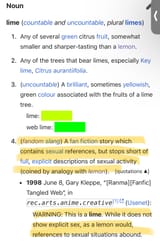Search Results
6/22/2025, 8:41:34 PM
“Lime”
https://en.m.wiktionary.org/wiki/lime
Etymology (Chemical)
>Middle English - lyme, lym, lime,
>Old English - līm
>Proto-West Germanic - *līm
>Proto-Germanic - līmaz
>Proto-Indo-European - *h2leyH- (“to smear”
>Saterland Frisian - Liem (“glue”)
>Dutch - lijm
>German - Leim (“glue”)
>Danish - lim (from Old Norse lím)
>Latin limus (“mud”)
NOUN
———
Chemistry:
Any inorganic material containing calcium, usually calcium oxide (quicklime) or calcium hydroxide (slaked lime)
Poetic:
Any gluey or adhesive substance; something which traps or captures someone; sometimes a synonym for birdlime.
>something which traps or captures someone
Theatre:
A spotlight
VERB
———
Transitive: To treat with calcium hydroxide or calcium oxide (lime).
Transitive: To smear with birdlime.
Rare: To ensnare, catch, entrap
>RARE
>ensnare, catch, entrap
Examples (Rare)
————————
William Shakespeare
“Much Adoe about Nothing”
1598–1599 (first performance)
[Act III, scene i]
>URSULA. She's lim'd, I warrant you: we have caught her, madam.
>HERO. If it prove so, then loving goes by haps: Some Cupid kills with arrows, some with traps.
Thomas Hardy
“Tess of the d'Urbervilles”
1891
Vol. 1, pg. 39
James R. Osgood, McIlvaine and Co.,
>Abraham, like his parents, seemed to have been limed and caught by the ensnaring inn.
—————
Etymology (Fruit)
>French - “lime”
>Spanish - “lima”
>Arabic - لِيمَة “līma”
>Persian لیمو “limu”. Doublet of lemon.
1. Any of several green citrus fruit, somewhat smaller and sharper-tasting than a lemon.
2. Any of the trees that bear limes, especially Key lime, Citrus aurantiifolia.
3. A brilliant, sometimes yellowish, green colour associated with the fruits of a lime tree.
4. (fandom slang) A fan fiction story which contains sexual references, but stops short of full, explicit descriptions of sexual activity (coined by analogy with lemon)
>picrel
https://en.m.wiktionary.org/wiki/lime
Etymology (Chemical)
>Middle English - lyme, lym, lime,
>Old English - līm
>Proto-West Germanic - *līm
>Proto-Germanic - līmaz
>Proto-Indo-European - *h2leyH- (“to smear”
>Saterland Frisian - Liem (“glue”)
>Dutch - lijm
>German - Leim (“glue”)
>Danish - lim (from Old Norse lím)
>Latin limus (“mud”)
NOUN
———
Chemistry:
Any inorganic material containing calcium, usually calcium oxide (quicklime) or calcium hydroxide (slaked lime)
Poetic:
Any gluey or adhesive substance; something which traps or captures someone; sometimes a synonym for birdlime.
>something which traps or captures someone
Theatre:
A spotlight
VERB
———
Transitive: To treat with calcium hydroxide or calcium oxide (lime).
Transitive: To smear with birdlime.
Rare: To ensnare, catch, entrap
>RARE
>ensnare, catch, entrap
Examples (Rare)
————————
William Shakespeare
“Much Adoe about Nothing”
1598–1599 (first performance)
[Act III, scene i]
>URSULA. She's lim'd, I warrant you: we have caught her, madam.
>HERO. If it prove so, then loving goes by haps: Some Cupid kills with arrows, some with traps.
Thomas Hardy
“Tess of the d'Urbervilles”
1891
Vol. 1, pg. 39
James R. Osgood, McIlvaine and Co.,
>Abraham, like his parents, seemed to have been limed and caught by the ensnaring inn.
—————
Etymology (Fruit)
>French - “lime”
>Spanish - “lima”
>Arabic - لِيمَة “līma”
>Persian لیمو “limu”. Doublet of lemon.
1. Any of several green citrus fruit, somewhat smaller and sharper-tasting than a lemon.
2. Any of the trees that bear limes, especially Key lime, Citrus aurantiifolia.
3. A brilliant, sometimes yellowish, green colour associated with the fruits of a lime tree.
4. (fandom slang) A fan fiction story which contains sexual references, but stops short of full, explicit descriptions of sexual activity (coined by analogy with lemon)
>picrel
Page 1
